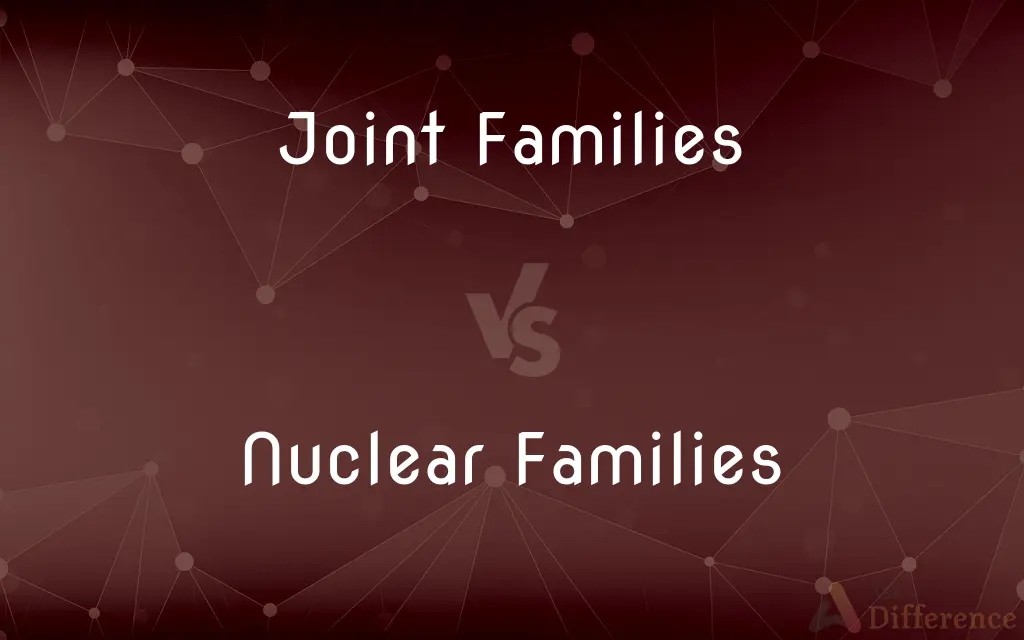Joint Families vs. Nuclear Families — What's the Difference?
Edited by Tayyaba Rehman — By Fiza Rafique — Published on November 21, 2023
Joint Families are extended families living together, while Nuclear Families consist of parents and their children only.

Difference Between Joint Families and Nuclear Families
Table of Contents
ADVERTISEMENT
Key Differences
In many cultures, Joint Families are traditional units that encompass multiple generations living under one roof. This means grandparents, parents, uncles, aunts, and children may all share a single household. The practice roots in the idea of shared responsibilities, both financial and domestic. This setup often emphasizes collective well-being over individual aspirations. In contrast, Nuclear Families are a modern concept where a family unit consists solely of parents and their immediate children. They live independently from their extended families, which provides autonomy but may lack the broader support network.
Nuclear Families focus more on immediate familial bonds, while Joint Families nurture connections across generations. Both have their advantages and challenges; Joint Families offer support and shared responsibilities, while Nuclear Families offer more independence and privacy.
Comparison Chart
Omposition
Multiple generations
Parents and their children
Size
Larger
Smaller
Decision-making
Collective
More individualized
ADVERTISEMENT
Support System
Broad, extended relatives
Immediate family members only
Independence
Less due to shared living
More, as living separately
Compare with Definitions
Joint Families
Joint Families are households comprising multiple generations.
In India, many people live in Joint Families where grandparents, parents, and kids cohabit.
Nuclear Families
Nuclear Families provide a sense of autonomy and independence.
Living in Nuclear Families allows parents to make decisions without extended family interference.
Joint Families
Joint Families foster intergenerational bonds.
Children in Joint Families grow up listening to stories from their grandparents.
Nuclear Families
Nuclear Families are common in many Western cultures.
In the U.S., Nuclear Families often live far from grandparents or cousins.
Joint Families
Joint Families emphasize collective well-being and shared responsibilities.
In Joint Families, everyone might contribute to household chores.
Nuclear Families
Nuclear Families might have less built-in support but more privacy.
Nuclear Families often rely on friends or hired help for support in childcare or housework.
Joint Families
Joint Families provide a broad support system.
During tough times, Joint Families rely on each other for emotional and financial support.
Nuclear Families
Nuclear Families focus on close, immediate familial bonds.
Many modern societies are seeing a rise in Nuclear Families due to urbanization.
Joint Families
Joint Families often follow traditions and maintain cultural practices.
Rituals and festivals are grand events in Joint Families, celebrated with all members.
Nuclear Families
Nuclear Families are composed of parents and their direct offspring.
After moving to the city, they started their own Nuclear Families, separate from their parents.
Common Curiosities
What defines Nuclear Families?
Nuclear Families consist of parents and their immediate children living independently from extended family.
What are Joint Families?
Joint Families consist of multiple generations living together, including grandparents, parents, children, and often aunts, uncles, and cousins.
How do Joint Families manage financial responsibilities?
In Joint Families, finances are often pooled, and expenses are shared among adult members.
What challenges might Joint Families face?
Joint Families might face challenges in space, privacy, and differing opinions due to more members.
Why might someone prefer a Nuclear Family setup?
Nuclear Families offer more privacy, autonomy, and direct decision-making.
How do Nuclear Families differ in decision-making?
In Nuclear Families, decision-making is typically limited to the parents, offering more individualized choices.
Can Nuclear Families be part of larger Joint Families?
Yes, Nuclear Families can be subsets within larger Joint Families but live separately for various reasons.
What's the main benefit of Nuclear Families?
Nuclear Families often offer more independence, privacy, and autonomy from extended family pressures.
Why are Joint Families prevalent in certain cultures?
Cultural, economic, and historical factors make Joint Families more prevalent in some regions, emphasizing collective living and shared responsibilities.
How do children benefit in Joint Families?
Children in Joint Families have a broader support system, learning from multiple generations.
How do Joint Families handle conflicts?
Conflicts in Joint Families are often resolved collectively, valuing harmony and consensus.
Are there hybrid models combining features of both Joint and Nuclear Families?
Yes, some families maintain close ties with their extended family while living separately, blending aspects of both models.
What's the primary structure of Nuclear Families?
The primary structure consists of parents and their children, living independently.
Do Nuclear Families feel isolated without extended support?
Some might, but Nuclear Families also build support through friends, neighbors, and communities.
Are Joint Families diminishing in modern times?
While still prevalent in some regions, urbanization and modernization trends have seen a rise in Nuclear Families.
Share Your Discovery

Previous Comparison
Clonazepam vs. Diazepam
Next Comparison
Coach Class vs. Business ClassAuthor Spotlight
Written by
Fiza RafiqueFiza Rafique is a skilled content writer at AskDifference.com, where she meticulously refines and enhances written pieces. Drawing from her vast editorial expertise, Fiza ensures clarity, accuracy, and precision in every article. Passionate about language, she continually seeks to elevate the quality of content for readers worldwide.
Edited by
Tayyaba RehmanTayyaba Rehman is a distinguished writer, currently serving as a primary contributor to askdifference.com. As a researcher in semantics and etymology, Tayyaba's passion for the complexity of languages and their distinctions has found a perfect home on the platform. Tayyaba delves into the intricacies of language, distinguishing between commonly confused words and phrases, thereby providing clarity for readers worldwide.
















































